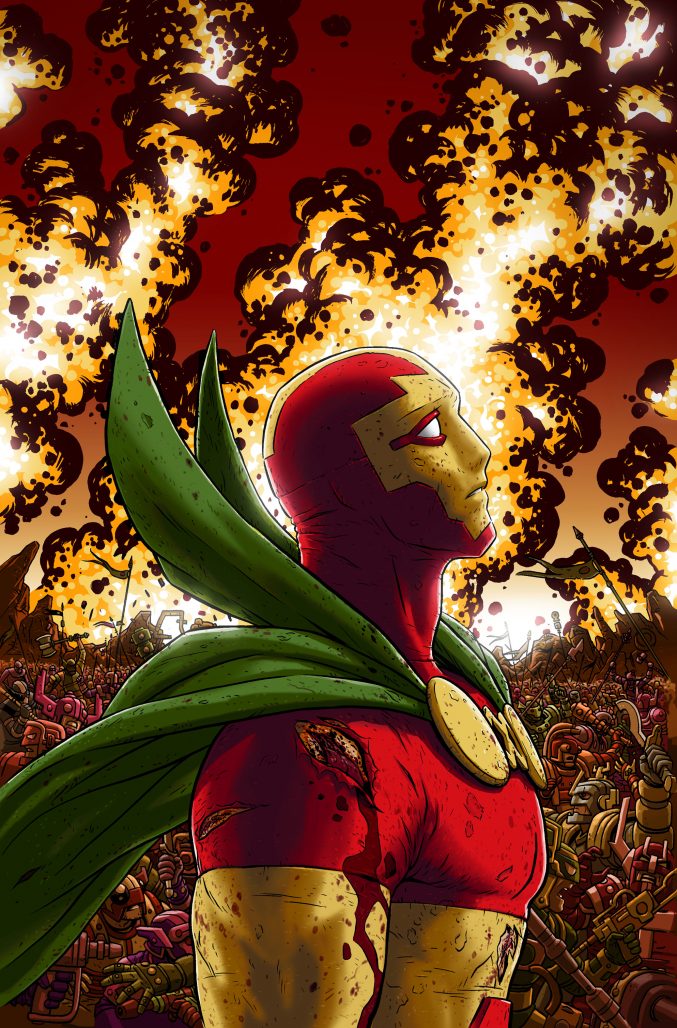
In advance of the release of writer Tom King and artist Mitch Gerads’ collected Mister Miracle series, DC Comics made the book available for review. So, our DC Round-Up crew–editors Alex Lu and Kyle Pinion, with contributing writers Louie Hlad and Zack Quaintance–recently re-read the story in full. Their subsequent round-table discussion can be found below…
KYLE PINION: Q1 – In delving into the collection of Mister Miracle (available in mass market retailers today), I’m curious…as I know you fellows all read the series on a month to month basis…is this the kind of comic that read better or worse or differently at all in one sitting vs. the month-long (sometimes more) waiting period between installments?
LOUIE HLAD: Definitely better in one sitting. While each issue is fun in and of itself, there are so many set-ups and call-backs that I didn’t catch while reading the issues month by month. This is the type of story that has a lot of consistency and seems meant to be taken as a whole. It was also surprisingly easy to digest in trade – it’s a real page turner.
ALEX LU: I dunno if I agree with that, Louie! While I think you’re absolutely right that there are refrains and callbacks in the book that are easier to catch when read in one goal, I think the series reads perfectly well in single issue sessions, too.
Sometimes you can tell that a creative team is building a book that is meant to read cohesively as a trade rather than from month to month. Those tend to be more plot heavy affairs that build conflict and emotional arcs as though you’re reading the book in one setting when you’re not, really.
With this one, while the book is definitely constructed a cohesive unit, most of the issues read like complete stories on their own. When I was making notes on the series yesterday, I found that each of them had a slightly different idea to explore rather than explicitly building on the previous idea. Sometimes they’d pile on, but not always.
ZACK QUAINTANCE: I think I agree with both of you here! To Louie’s point, Mister Miracle really is a book that deals so heavily in tone, quick references, slight twists of layered realities—just overall subtle storytelling—that some of what King and Gerads were trying to accomplish was lost for me with the 30-day breaks between issues. The end result of this one-sitting read (or rather three sittings spread over the weekend) was that big moments landed with more emotional impact.
At the same time, I think Alex is right about the chapters reading like complete stories. You can sum most of these issues up as the one where he’s on trial by Orion or the one where they fight and talk about the condo. They’re all very distinct–and more importantly satisfying–on their own.
I enjoyed both reads quite a bit, albeit maybe for different reasons.
ALEX: To be clear, I guess, I should say that I preferred the trade reading experience for the reasons you and Louie outlined, but there’s a reason why Mister Miracle #5 still sticks in my head as one of the best comics from that year.
KYLE: Right, and from your perspective, it’s the read to find out what happens next vs. the read to analyze the craft. Admittedly a new reader wouldn’t have that same experience, but it’s one that’s impossible to replicate…let’s talk about that actually…
Q2 – As any good comics publisher should, DC is looking for not only new readers but also evergreen graphic novels that can be handed off to those curious what all the buzz is about. Do you think Mister Miracle, as one whole unit, accomplishes those goals? I realize they’ve added contextual material (drawn by Mike Norton) to make the concepts more approachable, which is welcome…but could you hand this to a new reader? Given the critical plaudits, is it a part of the “canon” now? Should it be?
ALEX: For whatever reason, I distinctly remember reading the Mike Norton material around the time the book came out– it might have been an ashcan somewhere or some ancillary marketing material stuck in another book.
LOUIE: I don’t think I’d hand this to someone who has never read a superhero comic, at least not as their very first exposure. There’s an awful lot of history behind these characters and – even though they do give a quick backstory of the Fourth World – it’s got to be pretty confusing to someone who doesn’t understand the setting and history. How would you make sense of Metron’s appearances? Or figure out who is sitting around the table during the war negotiations? And then the Furies pop into the hospital room…I think it’s probably too much to take in if you’re not used to it.
But for someone with a basic understanding of New Genesis and Apokolips, this is a nice self-contained comic that doesn’t require you to know ALL of the DC Universe. So I think it just depends on the audience.
ALEX: Once again, I think I kind of agree with you, Louie, but perhaps not necessarily completely. I do think that, despite Mister Miracle being positioned as a big player in the growing book market and beyond, there’s a lot of material in here that is simply taken as a given without much context. Even I, someone who has been reading comics for a while now, wasn’t aware of every character or conceit the book was bringing up. After all, besides Darkseid/Final Crisis, DC hadn’t really been mining the Fourth World for a ton of material until very recently.
I loved it though, in spite of not knowing what was going on for arguably the majority of the book, because there was enough for me to latch onto. There was enough unique visual play happening and some interesting easy-enough-to-grok ideas at hand that I could say, “well, I don’t entirely get it, but I do like it enough to take a lot away from it.” And I feel like that could be the case for Mister Miracle as well.
LOUIE: I love it when we almost kind of agree! And yes, you don’t have to get all of it to “get” it.
ZACK: A simple litmus test for whether you can easily pick up on the majority of this story might be whether you know who Jack Kirby is, given how central his analog is to the emotional climax. But as you’ve both noted, you don’t necessarily need to pick up on all (or even most) of what’s going on to enjoy this book.
KYLE: I might note, I handed this book to my partner who reads zero superhero comics, and Vision was the only thing I’ve ever seen her want to read as it was coming out…and she loved Mister Miracle.
LOUIE: My wife loved it as well, actually. But she had a lot of questions.
KYLE: I think perhaps we give new readers less credit than they deserve in a lot of cases. I tend to believe people can always pick up pieces and context clues pretty easily. Even a headier read like this.
ALEX: To some extent, I would honestly argue that if you’re willing to tolerate the fact that these characters have a lot of weird -isms like their names, character designs, etc., you could read this book and enjoy it for the themes and arguments it presents– most of it has very little to do with the discourse taking place in superhero comics. That is, of course, until the end.
That ending I think, works one way if you’re invested in the discourse of comics, and it still works if you’re not, but you lose a layer. Because I do think that, as much as that ending is about the idea of choosing peace over conflict, it’s also a bit of an indictment about superhero comics in the same way that that part of Bojack Horseman’s comment about there never being a happy ending because “there’s always more show” is.
KYLE: Well said, I’d like to do a deep dive on that ending here in a bit, but first I want to talk about the beginning…
Q3 – Prior to this series, Scott and Barda aren’t exactly blank slates, but outside of comics like Himon, I can’t say for sure that the characters have ever had this kind of in-depth character study. Now admittedly, there’s a good deal of author projection here – with King wrapping his real world experiences with war, depression, parenthood, near-death experiences into this series – but do these characters ring true to you as you know them? Do you come away from this book thinking you now know Scott and Barda better than ever before?
ALEX: This is a part of the conversation I’m going to have to step back on, as I’m not nearly as well versed with the longterm canon of these characters as the rest of y’all are. However, I will say that the one thing I was familiar with– the relationship dynamic between Scott and Barda– rang very true throughout the story. From the domme role Barda plays in the bedroom to the heavy lifting she does in their relationship– not just physically but mentally– that all felt very nuanced and true to a certain type of relationship. On the latter note, especially in the context of a relationship with someone who suffers from depression.
ZACK: Watching a couple deal with LA traffic might be the purest way to learn about their relationship…warts and all. But jokes aside, I think we do get a much better understanding of the two of them from this comic. As Alex pointed out, we see them in the bedroom together and we see the way they lean on each other, both on the battlefield and in their quieter moments, those times at the end of the night where they’re exhausted and content together on the couch.
LOUIE: Do they ring true? That’s a big yes from me. I’d go so far as to say these are the best versions of these characters ever portrayed. Author projection is what brings in depth and emotional resonance, and I feel like King & Gerads completely nailed some important aspects of what these characters were always meant to explore. These characters are us, after all. I want my fictional heroes to tell me something about myself. Mister Miracle is the great escape artist, and this comic explains why we connect with him and what we’re all trying to escape from. The way Scott & Barda’s marriage is explored is so rich as well. There was a lot to relate with here and I really enjoy this kind of depth in storytelling. There are always different layers and different direction you can go with a character – so I wouldn’t say this is the only take that works. But it sure as hell worked for me.
KYLE: Q4 – Alright, since we’re in general agreement about depth of field here, let’s zero in on the three core themes as I see it:
Depression
War and the Trauma brought about by same
Parenthood
Alex, since you specifically mentioned it, did you feel the text had something thoughtful to say about depression and navigating that in a relationship? I’m curious to unpack that with you a bit (though feel free to chime in as well, guys)
ALEX: Well, before we move to a broader analysis, I want to look at something specific that rang true to me. In Mister Miracle #6, page 153 of the trade, after Barda tells Scott that she’s pregnant, Scott says “I love you.” And all she can say in reply is “I believe you, Scott Free.” Having had a relationship dynamic like this in the past (and being the Scott in it), Barda’s put in a terrible position throughout this story. She spends the bulk of the book carrying Scott along. After having tried to kill himself in the first issue, he spends a lot of this book being passive. When Orion sentences him to death, he tells Barda he’ll fight death only if she wants him to. He’s passive where she’s active. She’s driven where he’s defeated from go. And even here, only the announcement of her pregnancy gives him the impetus to say “I love you.” Again, he’s been led rather than being an active participant in the world and their relationship. Speaking from experience, that kind of person is tough to love. Because– I think, at least– when Scott says I love you at this point, he’s mostly saying “I need you to give me a reason to live.” And as she points out later on, it doesn’t seem that her presence in his life is reason enough.
LOUIE: That was powerful. It makes sense that the great escape artist is always eyeing the exits, even in his marriage and life itself. Scott’s personality here is so different than we usually see in superheroes…it speaks to a personality type that doesn’t typically get representation in these books.
KYLE: Do you think the author relates to that kind of protagonist? Is there a sense of pity? I’m curious what you think the subtext is. (Obviously I could look up interviews and get the answer direct, but I’m more interested to know if it pops out to you as a reader)
ALEX: Well, we could totally go down a hole trying to psychoanalyze Tom King in the context of basically every book he’s written since coming to comics, but I don’t know how much good that does us. I do think that he emphatically understands the character he’s created in Scott, however.
ZACK: I read Scott Free as a pretty close analog for the author throughout.
ALEX: And of course, lest we fall into the Gillen-McKelvie paradigm, we can’t deny the role Mitch Gerads plays in shaping who these characters are, either. Not to mention the editors, even, who are important enough to get a big shoutout in the end credits.
LOUIE: I can’t speak for the author but the subtext, to me, is a pervasive sense of desperation and hopelessness that lingers in the background of our psyche. The constant drumbeat of “Darkseid is” in the back of Scott’s mind makes him want to give up, to take the easy way out. His daily life is a constant struggle to remain positive (“I can always escape!”) in the face of incredible challenges and pain. Depression is kind of a stagnant lingering dread that doesn’t really get resolved most of the time. Scott is learning how to live his life with that cloud hanging over him.
KYLE: That’s a persuasive argument Louie, and I struggled a bit to grasp the “Darkseid is.” bits beyond what I figured the in-story purposes were, but you read it more as an outward manifestation of his own depression rather than the Anti-Life equation or whatever? Or is it both?
LOUIE: Depression is the anti-life equation. It’s noticing the walls of the life trap that are closing in on you and knowing that there’s really nothing you can do to escape it. We are hemmed in by these boundaries (duty, expectations, personal limitations, whatever) that keep us from feeling true freedom. To me, the real thesis of this book is: There is no escape. Now what will you decide to do with this knowledge?
ALEX: That’s an interesting read on it. And it’s supported by the last page of the comic (300), where Barda says “Darkseid is.” and Scott replies “yeah, I know. But…we are, too.”
KYLE: I like it! Well, not depression obviously, but the analysis.
Zack, to rope you in here, we had a pretty interesting conversation about how this comic presented war and conflict. And I’m still torn on that subject. My re-read brought some of this to the fore, in that this is a book that ruminates deeply on the trauma that Scott and Barda faced (that haunting imagery in front of the Goodness Mirror), but seems to present warfare itself as something that’s necessary. I find it hard to square these two things together, maybe they can’t be?
ZACK: I think that’s maybe the point, or at least part of it. That idea seems to come through clearest when Scott is put on trial by Orion early in the series, and what starts as a simple true-false exercise that mildly annoys Scott, sort of degenerates into twisted logic and eventually him screaming, acknowledging that he feels intense hate and that at some point he maybe became exactly what he set out to combat. I took that as a direct commentary on how it feels to have gone to war, as King himself did.
And there’s more scattered throughout…Bug complaining to Scott that his disenfranchised people are being used as cannon fodder, Lightray zapping a smaller parademon as Scott protests that it might be a child, and Scott eventually collapsing, anguished, in the field after a battle as he sings Daddy’s going to buy you a mockingbird into his mother box. These broader war scenes to me raise more questions than they provide answers, which I think is the role of the best fiction. I’d be interested to hear what you all thought, and if anyone had any theories about how it applies to some of the other throughlines we’ve discussed.
KYLE: I know Louie had a somewhat conflicting read to yours when we talked offline, but I’m not sure how a second run-through impacted that.
LOUIE: Not necessarily conflicting, but I took most of the war stuff as more allegorical. Like, it could be used to represent any conflict in our lives. There are always battles to be fought and once you defeat one despot, another rises in his place and the battle rages on and on. That’s the grind of life, whether you’re fighting in actual wars or not.
ALEX: As much as this book seems in conflict with itself when it comes to the nature of war, I think it has a stronger indictment on the nature of power. There’s a repetitive idea throughout the book about “the face of god” and whether one can or should know it– at one point early on, Metron says that Scott is not to know the face of god. I took that to be a riff on the idea that “power corrupts,” and it’s something that we see happen to Orion when he becomes the Highfather and later on, something we see happen to Scott in a lot of ways when he takes on that role.
And by the end of the book, you have Desaad, who we find to also be Metron, shaming Scott in Darkseid’s throne room, saying ““Pain makes you steady, strong. Able to conquer, rule. But what did you do with all your pain? Performed. Married. Bred. What a waste.”
Almost as if to say, “why did you fight this whole time only to take yourself out of the game?” And, to tread towards the ending again, Scott does take himself out of the game. And he seems happier for it. Although I suppose him being happier doesn’t necessarily answer the question.
Like…why do any of us struggle if we’re going to just give up halfway up the latter, I suppose, is a question this book doesn’t have as certain an answer on.
I’m just babbling now.
LOUIE: Everyone’s a critic, right? I think this ties into that third theme of parenting that Kyle identified as well. In that last issue, it seems like everyone wants to appear to Scott and tell him what he should have done. He was even faced with the same decision that his father had – sacrifice your child to bring peace – and Highfather chides him for choosing differently. But in the end, it’s about the decisions we make. Scott can’t care about what anyone else thinks.
ZACK: I might be about to babble with this, but bear with me: I think there’s a broader idea of escapism via stories and comics at work here. Like, not to discount the contributions of anyone else involved with the comic (especially Gerads, whose drawn one of the best-looking comics of the modern era), but I took a lot of this to be a sort of blurry pastiche of King’s life…going to war, making those choices, living in LA, chasing or getting fame, getting married, having kids, etc…and the escapism was into the fourth world concepts, which maybe weren’t happening at all, and certainly not in continuity. One thing I could never quite square for myself was what was and wasn’t real in the fourth world segments. Like, we know Orion wasn’t killed, we just saw him in the Justice League Annual.
KYLE: That’s a nice segue into the metafictional elements actually…
ZACK: Good! I’m glad that rambling could get us somewhere productive…
ALEX: Well, we’re definitely getting in the weeds now but my take was that literally none of this book was in continuity, contrary to what I believe some folks involved were saying initially. I think Metron, obviously, might have taken actions that are technically in continuity, but when he reveals the existence of the “other world” to Scott, you even see another Barda in that spread. Maybe, at one point, the Scott in this story was in continuity, but by the time this story starts– maybe when he tries to kill himself– none of it is.
KYLE: Q5 – This is a book peppered with internal knowledge of its creators, beyond both King and Gerads…as it not only goes out of its way to reference Kirby through the “boy at school” interludes, Oberon’s appearance and last name, Scott and Barda’s childrens’ names…I was going to ask you the value you took from these beats, but I think we’re focusing more on the question of continuity now, which is also an interesting subject because:
Kirby’s original Fourth World comics sat somewhat outside of the larger DC canon, not counting the retrofitted Jimmy Olsen series, and it almost seems as if through this series (a few cameos aside) King and Gerads returned the New Gods to that “outside the DC infrastructure” status a bit. Even when faced with the choice of doing so, Scott refused to return to the mainline continuity. I’m not actually sure there’s a question there, but moreso a statement of intent?
I’m sure you guys have a much less nerdy, more thoughtful take on what all of that really means, of course.
LOUIE: LESS nerdy? You’ve come to the wrong place.
ZACK: You’ve underestimated our nerdiness and overestimated our thoughtfulness!
I thought the metafictional beats were incredibly significant. There’s so much going on in this comic, and I’m maybe captivated by a different idea here than the rest of you, but I thought there was a lot of King grappling with his fast rise to comics fame. Batman kills babies being repeated several times seems significant, as does Funky (the Stan Lee analog) raising his kid when he and Barda aren’t around. I don’t have an articulate theory on what it all means, but I will say it’s lingered with me just as much as the commentary on work life balance or finding joy in domesticity.
LOUIE: I’ll throw out a take that works for me. There are many universes, and we (or the hero stand-ins in our stories) can choose which one to be in by the actions we take. Scott could create a world where he remains married, or one where he leaves. He could be a parent or not. He could decide to kill himself on the bathroom floor. When Metron shows him a glimpse of the “real” DC universe, it’s just another choice for Scott to make. The grass is always greener, and it’s not always easy to decide what you want your universe to look like. Comics are a fantastic medium for exploring this concept. What makes the main DCU the real one? Just that more stories are set there? If Scott wants to reject that world and live in this one of his own making, then that’s real for him.
ALEX: For me, I think this ties back around to the issue of accessibility that we discussed earlier. Something I often find myself asking– more and more so these days, is “what is a superhero comic?” Comics, obviously, are a medium full of genres. But I often feel like superhero comics, for good or bad reasons, are off on their own discursive sphere separate from even the rest of comics. The stories these books tell often fall outside the realm of the action and adventure I think they started off being associated with, so when I encounter a book like Heroes in Crisis or Mister Miracle, I find myself asking “what does this book being a superhero story add to it? Why can’t this be just a regular book with regular folks about living and grappling with war and depression?”
KYLE: Well, it’ll sell more probably…not to be a cynic.
ALEX: Well, yes. But we’re talking ~art~ here, not commerce. Although we can go into that as well.
And on one level, I think Mister Miracle being a superhero story gives the heavy themes it’s dealing with an extra few levels of separation. But on another, I think that engaging with these ideas of superhero history and then choosing to extricate itself from those elements at the end of the book makes Mister Miracle a story about the futility of these kinds of typical superhero stories.
KYLE: From a creative standpoint and what maybe helps necessitate why this can be told in the way it is: I do think Mister Miracle is pretty fertile ground for this kind of storytelling…and some of it stretches back to my blank slate proposition. The truth of the matter is, and I’ve said it before, the standout Fourth World material outside of Kirby’s own always seems to stretch back to Orion. And so here, we’ve got a different perspective on a protagonist whose side of “The Pact” hasn’t really been touched on in the same way (to my recollection, my memory sucks admittedly).
LOUIE: It’s partly about expediency, no? We can shorthand so many things when we start with the superhero playing field. Barda and Scott can open a boom tube, fight in a war, and then be back on their couch discussing it within a few pages. The author doesn’t have to take pains to make it believable or explain the mechanics of the world because we’re already suspending our disbelief when we pick up a superhero comic.
ALEX: I don’t think that’s necessarily true. Jump cutting is a thing if you wanted to set a story like this in the real world. Though you run the risk of things being too melodramatic and not being able to couch it as much, I suppose.
To Kyle’s point– I don’t have much to say this because it’s a little too continuity-dive for me– but I do love it when a prophecy is twisted in its fulfillment.
KYLE: I actually had forgotten the twist with the sword. Or blade, rather. It’s a good one.
The truth is, I never think of Scott as Darkseid’s son, and to see him referred to as such so often threw me the first time I read it. It worked better for me this time around.
ZACK: A psychologist would also have a field day here with Scott’s wife murdering his mother figure…
KYLE: No doubt, and his more forgiving attitude toward Granny Goodness vs. that of Barda is worth diving into in of itself, but there’s only so much time in the day….so let me ask this:
Q6 – What are your standout moments from the series?
ZACK: Darkseid double dipping the carrot off the veggie tray comes to mind, for the novelty.
LOUIE: The quieter moments between Scott and Barda are the big draw for me. She alternates between roles: being the soft, supportive wife who picks him up when he’s feeling weak, and then soon afterwards displaying annoyance at him and telling him to get his shit together. There are a lot of small scenes with just the two of them that made the series.
And visually — the way that some panels are displayed in a static fuzzy way, like someone forgot to adjust the vertical hold. I thought the visuals were really powerful.
KYLE: That actually ties into mine as well, which is Gerads’ use of the nine-panel grid. I think too often we talk about “wide-screen” storytelling in comics, which for larger than life epic battles can be welcome, if overused. But rarely do I feel like a superhero comic ever displays a “filmic” quality. Gerads maintained that throughout, especially in his standout chapter, where Barda and Scott run through the New Genesis gauntlet.
ZACK: Absolutely. His use of white and dark space in that issue on some of those grids was especially striking.
KYLE: And I know the nine-panel grid is comics shorthand for “serious” these days, but I think he cracked the code. I love the guy’s work.
ALEX: Agreed, Kyle. I think nine panel grids are often tough for artists because there’s a lot of monotony involved with repeating backgrounds and angles, but Gerads seems to revel in it, finding ways to make that restraint compelling.
But at the end of the day, I’m a romantic. I live and breathe for the worlds we build with one another when we’ve chosen to stake out a place for someone else in our hearts. Mister Miracle #5, and really the comic as a whole, is filled with these beats that showcase the strange and often disturbing world Scott and Barda have built together– the fact that they can laugh about their “song” being the “moans of the damned” is over the top, but so true to the specificity of in jokes that develop in relationships. And it doesn’t hide from showcasing the frustrations of a long term relationship, either, in big moments such as Barda’s confrontation with Scott about his suicide attempt and in small ways like how neither of them really understands how a New Genesis shower operates.
People often talk about wanting comics where their favorite heroes just get to sit and talk over coffee– this book is, in a lot of ways, pretty close to fulfilling that dream.
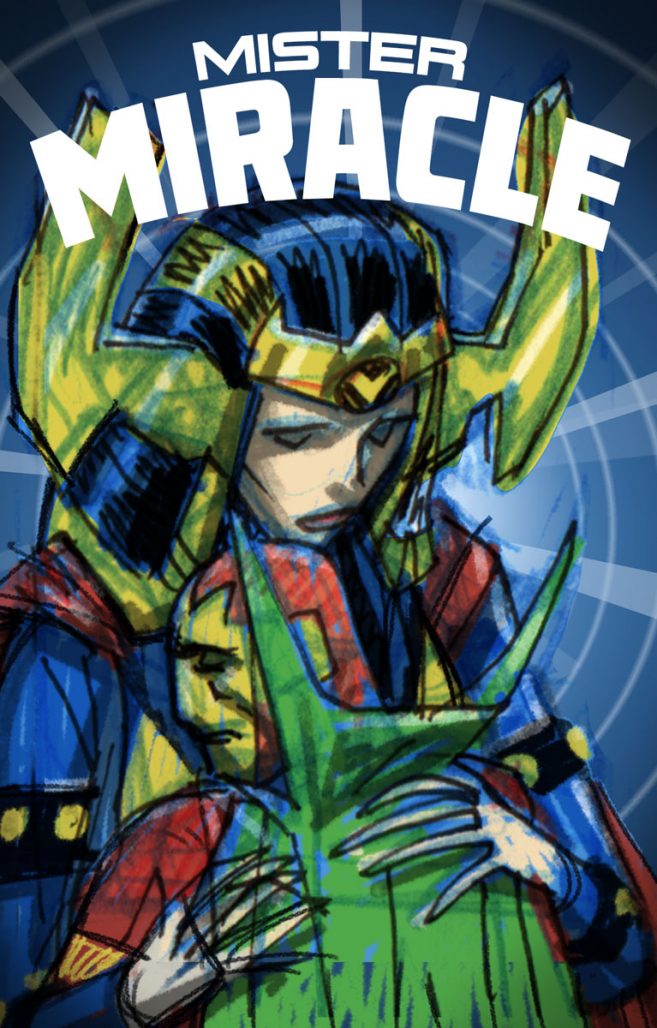
KYLE: That’s a good observation, though it does lend a question about why you’d want to make the genre something it isn’t?…but that’s just me being me, I like that issue a lot (as you can find in my review from when it came out)
Okay, final question from me and then I’ll open the floor:
Q7 – Does it stick the landing? Or is the journey strong enough for you that even if the ending doesn’t work for you in whole the destination is secondary?
ZACK: I found the ending far more satisfying upon a second reading, perhaps because I was reading more analytically and less for answers. To your question about the journey, I think that’s the case, perhaps by design. It’s a story about appreciating the peace in your life, and it’s maybe fitting there isn’t some neat, ultra satisfying conclusion.
LOUIE: Agree. The ending is somewhat unsettling, in a way that absolutely works. It’s interesting that they put the climax of the action in the penultimate issue, and then allowed issue #12 to be a sort of epilogue where Scott unpacks everything that happens and is still trying to make peace with it all. It gives the impression that the end isn’t really the end, which fits thematically perfectly with the main concepts of the book.
I especially like the page of the final issue that shows young Scott Free asking about what the Fourth World is, and receiving the answer that it’s the world he is imagining an escape to. So it’s not about what came before, but what we want to come next.
KYLE: Is that Scott Free? Is that a Young Jack Kirby? Is that somebody else entirely? I like that ambiguity.
LOUIE: “If you like ambiguity, you’ll love Mister Miracle!” -The Beat
ALEX: I think ambiguity in storytelling gets a bad rap, all the fun stuff—the theorizing, fan fiction, and seeds for future stories—come from the spaces between what’s said.
KYLE: Cool, so definitely Tom King as a kid then?
ALEX: Sure, why not!
KYLE: I’d say Mitch, because I don’t believe Tom ever had hair, but I figure Mitch must have had a beard at 6.
ALEX: And like y’all, I also found that the ending was better on re-read than I did when it first came out. Now that I’m no longer itching for answers I’m not getting about this story, I appreciate the strength of what this ending ultimately ended up being.
Mitch was born bearded. Seidburn is.
KYLE: Not getting any better than that, gang! Any last remarks or things left unsaid?
LOUIE: Nope, none here.
ZACK: Certainly nothing better than, ‘Seidburn is.’
ALEX: I think this is the end.
But there’s always more show.


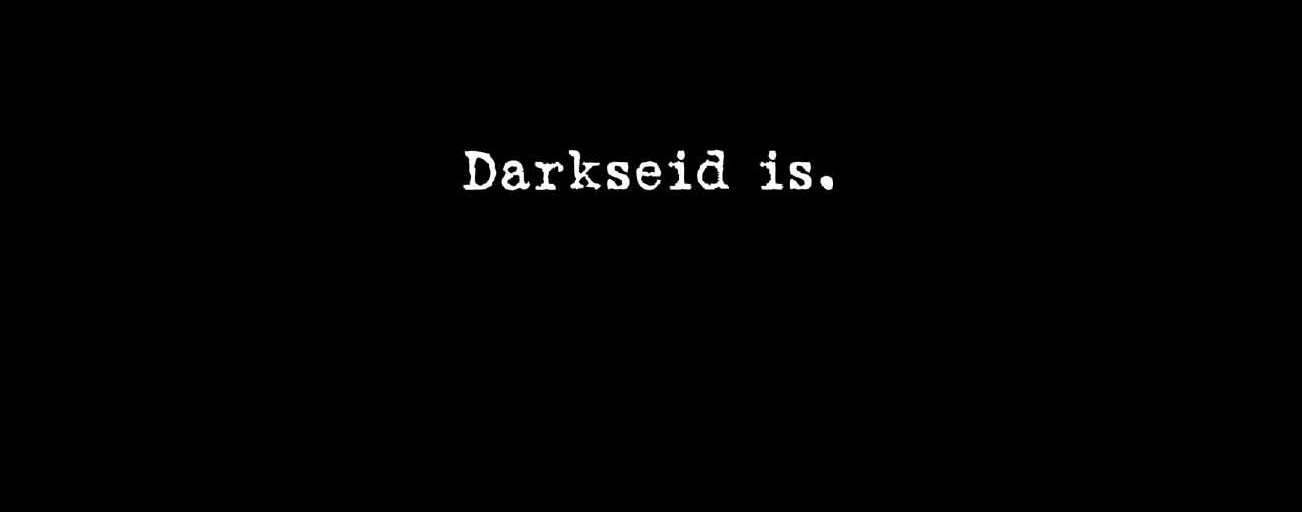
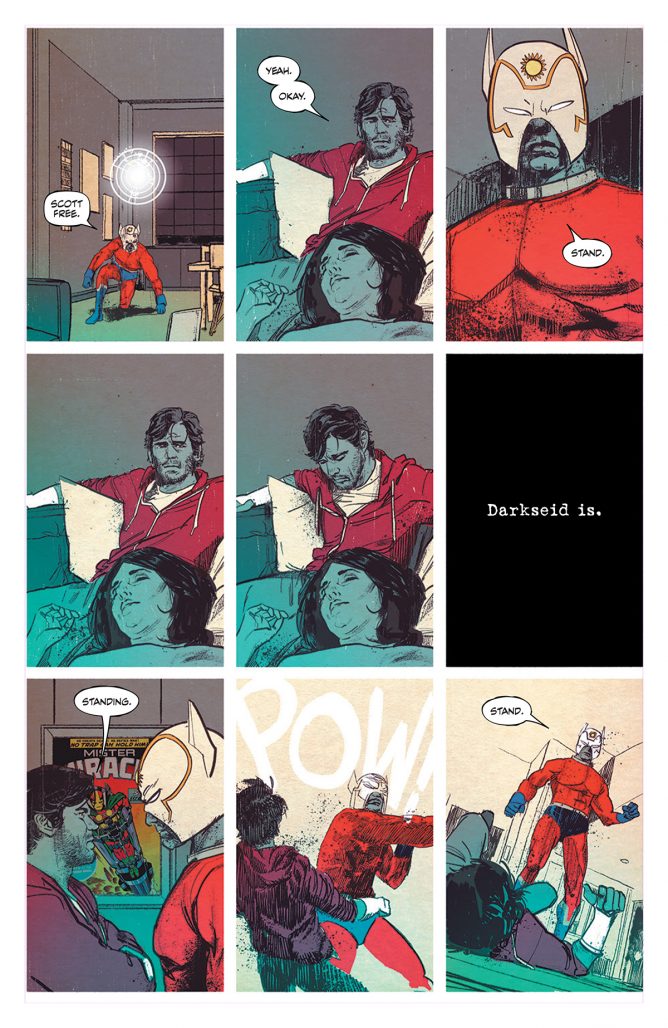
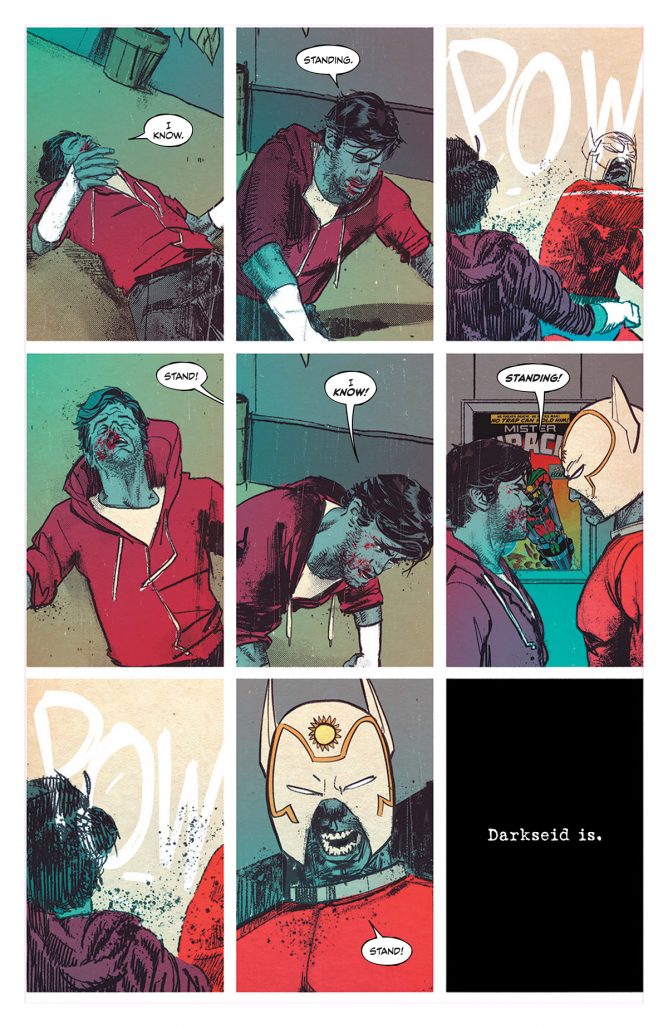
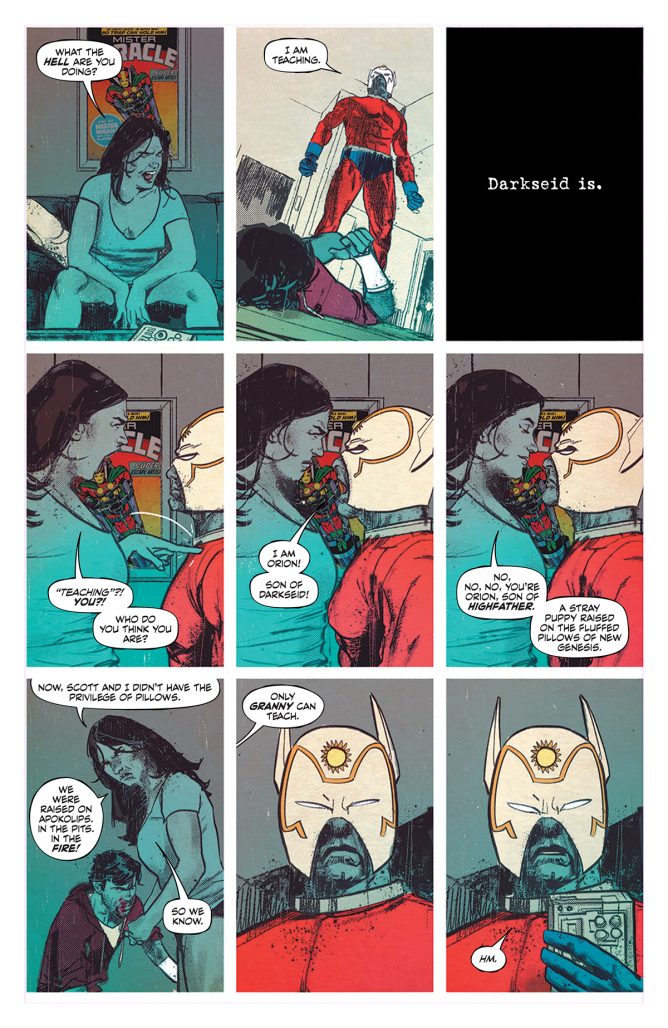
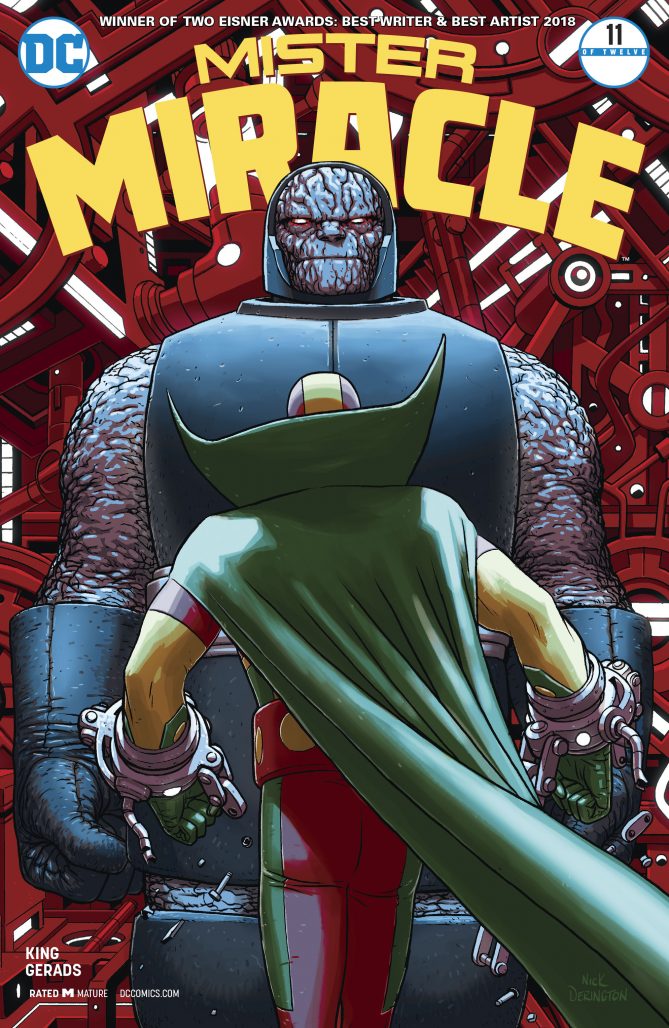
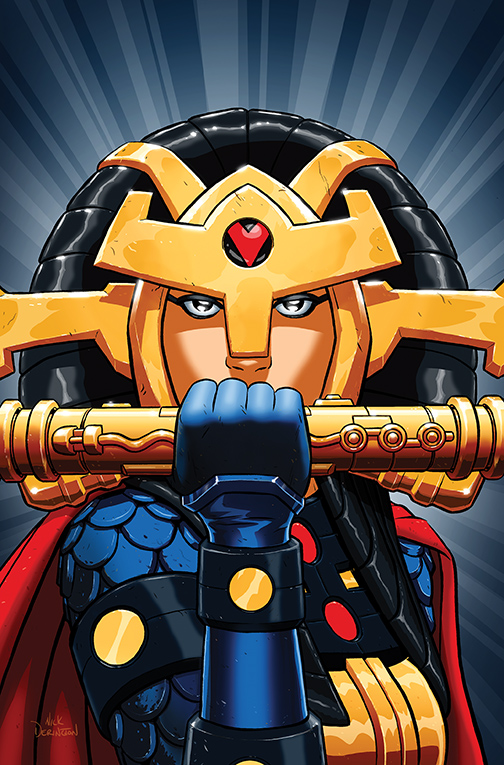
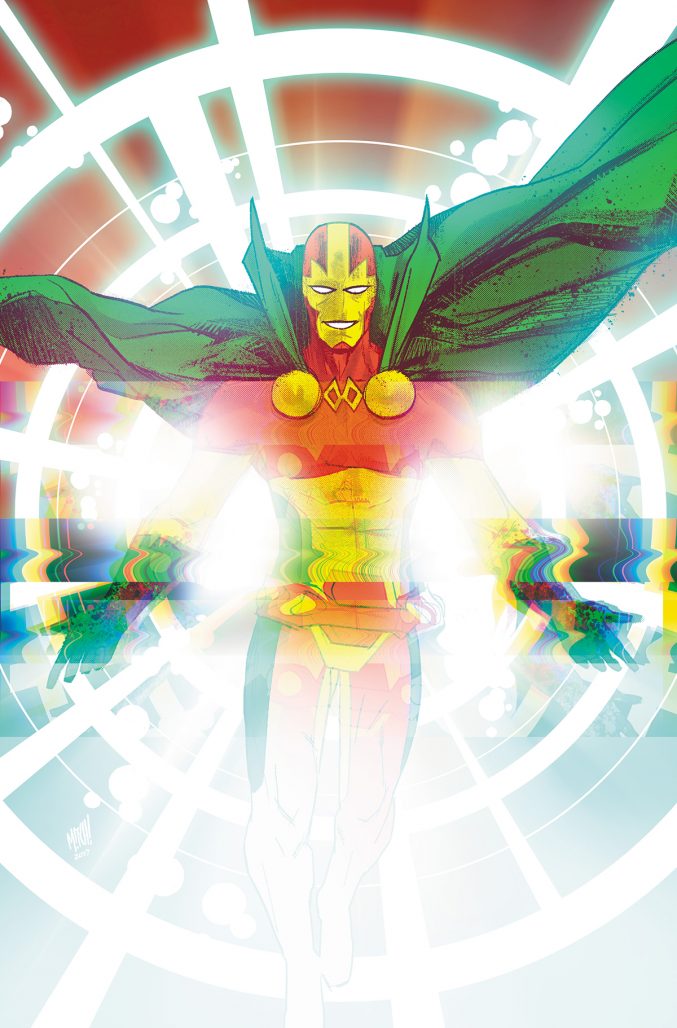
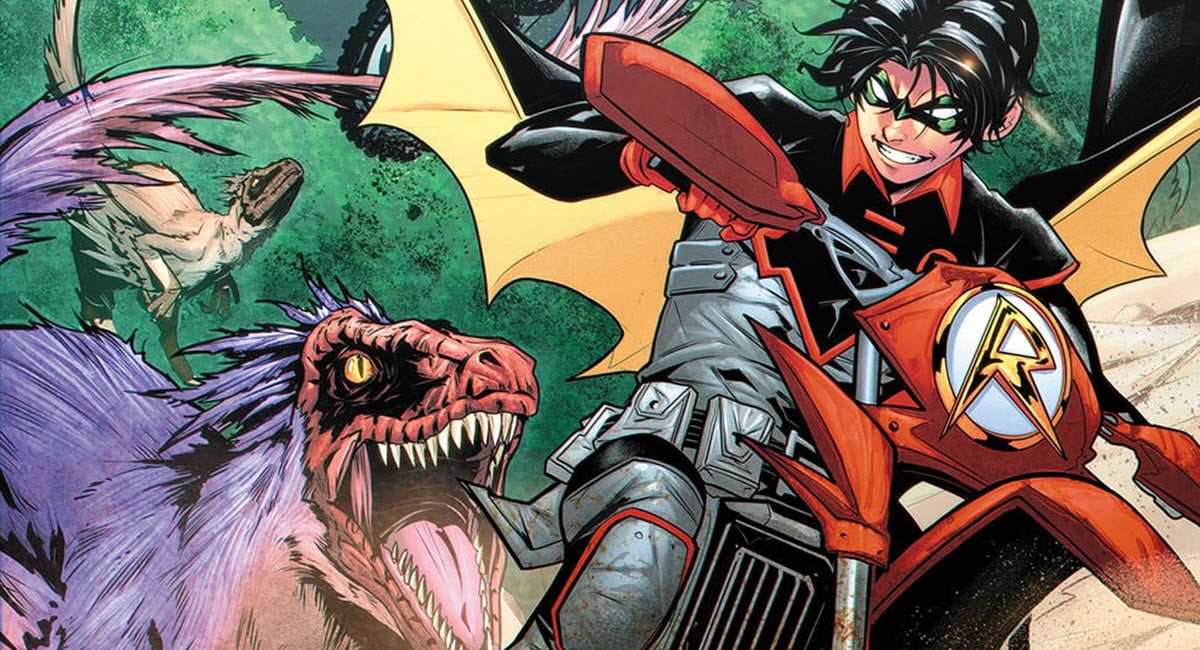
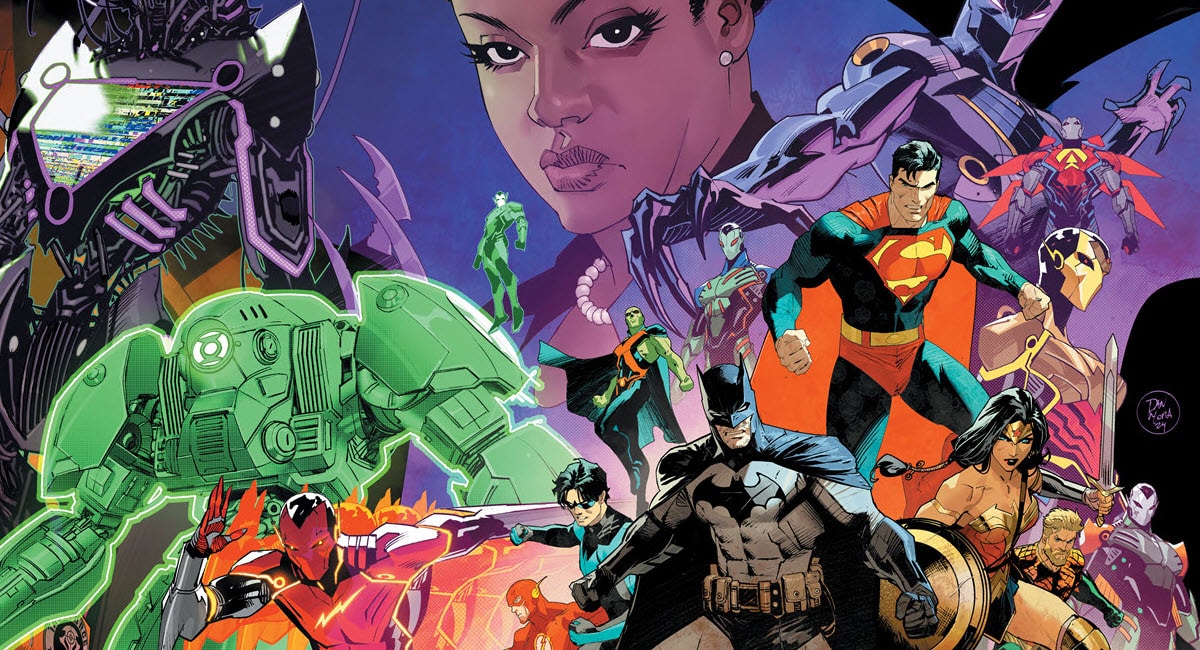
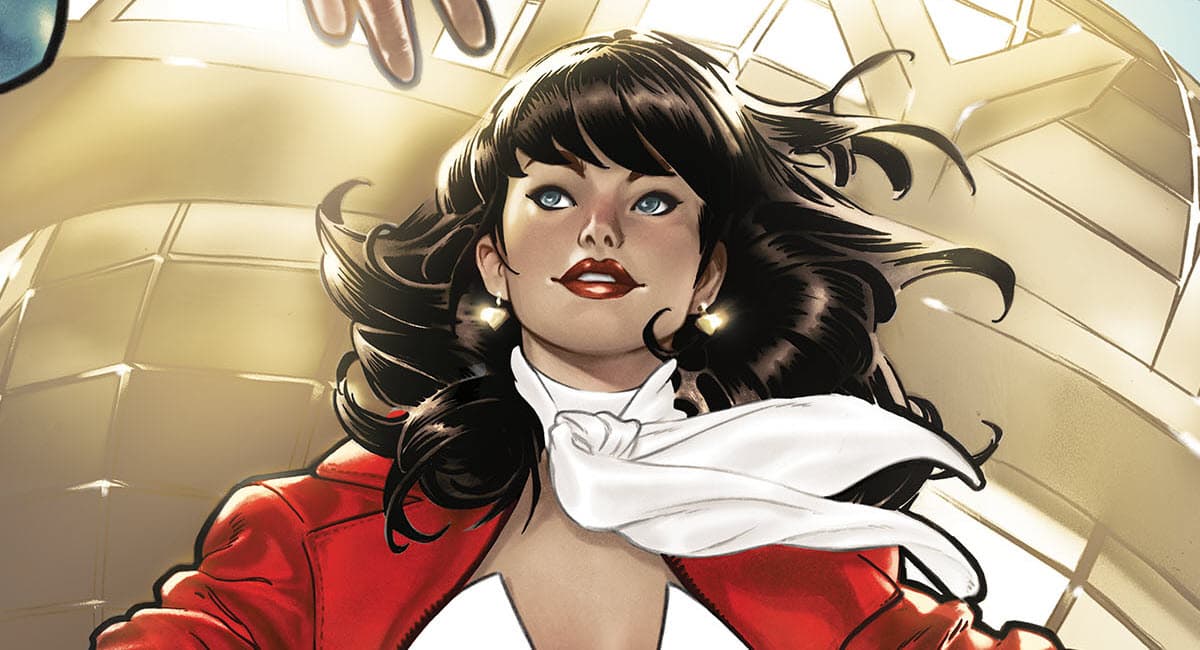
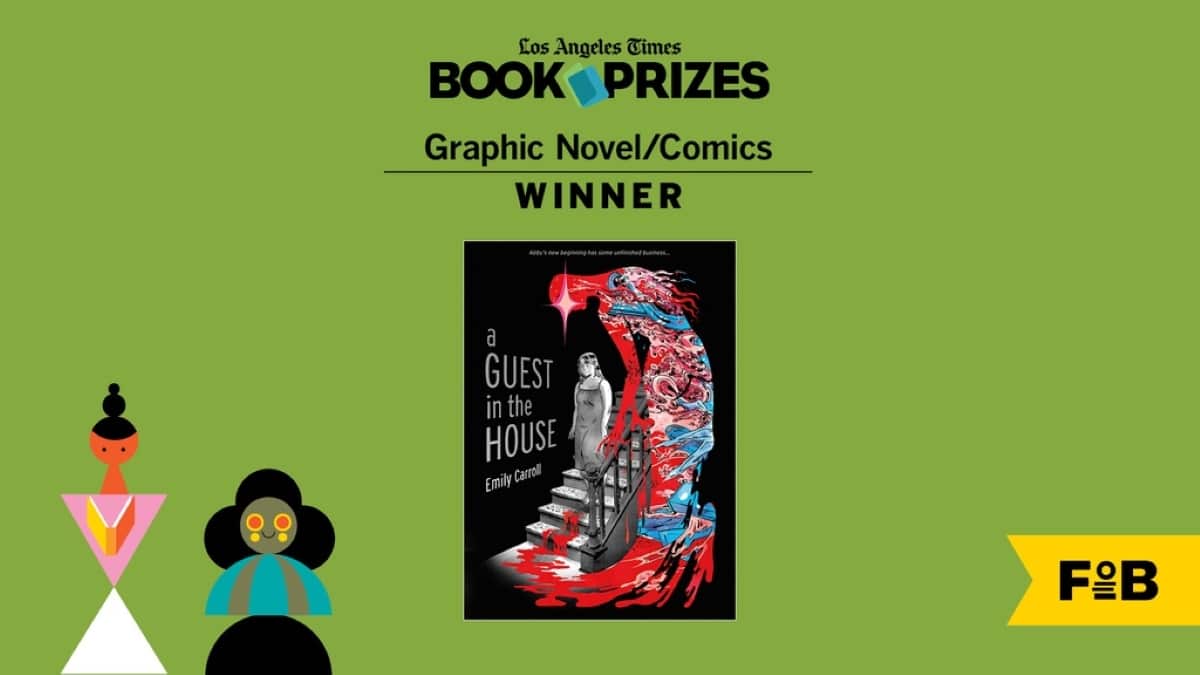

First, I still feel like everyone who overpraises Mister Miracle hasn’t read Kirby’s run, which doesn’t get enough credit for being complicated and dark and thoughtful.
I still feel like every Tom King comic is about him. Tortured, depressed heroes. It was eyerolling with Sheriff of Baghdad (when it was marketed and promoted as being about him), but it’s getting tiring. It’s hard not to wonder if we’ve seen all that he’s capable of writing. That’s not to say he’s not good, but he doesn’t seem to have anything more to say about human beings or the world, and he doesn’t seem to understand anything else well enough to be able to write about.
Honestly I just hope that he’s in therapy. Cause between this and after his whole “true love” Superman story which is all about Lois getting brutally murdered over and over again…I just hope the dude’s getting some help.
I think y’all missed the mark some with Barda responding “I believe you” to Scott’s “I love you.” There are deeper forces at work.
Earlier in the issue, Scott asked Barda if she ever believed Granny when she told them she loved them. Scott had sometimes, Barda never did because she didn't expect love. Now she's developed emotionally and their relationship is such that when Scott says it, she believes him.
Barda is only really emotionally vulnerable a few times across the series. Each time involves the possibility of losing Scott or her son. The "I believe you" moment is the closest she gets to true vulnerability outside of those occasions. That's just my take though.
This was a really cool feature. I don’t know if I would rate Mister Miracle quite as highly as everyone in the roundtable here (I did like it a lot), but this type of criticism is awesome to see and extremely well-done.
“First, I still feel like everyone who overpraises Mister Miracle hasn’t read Kirby’s run, which doesn’t get enough credit for being complicated and dark and thoughtful.”
AND it doesn’t bask luxuriantly in human misery to prove how “artistic” it is. AND Kirby didn’t portray Barda as a misogynistic caricature of a “strong” woman who only softens because of Scott’s magical healing dick. But hey, Kirby didn’t present his stories with freshman art student levels of pretentiousness, so it’s obviously lesser.
Glad to hear one person, at least, thinks King is a miserable one-trick pony who tells the same story about the same proxy every time and desperately needs therapy (especially after his response to the Lois Lane snuff porn comic). However, I disagree about his work being good. No character he uses, with the possible exception of Batman, will be usable for some time because of how much overpraised garbage has been caked onto them.
I just want him to get a bog-standard “gee, it’s so hard being a white man in this crazy modern world” cable drama so we can go back to telling decent, non-miserable stories that don’t pretend they’re “destigmatizing” mental illness by treating it as something masturbatory & “deep”.
I have to back up Al and kakapolver, with the added caveat that I haven’t read Mister Miracle. It just never seemed to me like something I wanted to read, because my experiences reading Grayson, Vision and, most of all, Batman, had long since made me stop caring about a Tom King comic. I DO think he’s a one-trick pony, relying on one emotional through line (damaged people living through trauma). I just like to read comics that do more than tell the same story every time, just from a different angle, and that ultimately feel like they’re not about the character on the cover, but the writer. I’m beyond tired of the mentions of his CIA past, as well (for the record, I have no problem with believing he was in the CIA, or even his involvement with the CIA. I just don’t care at this point).
And I would despair if Tom King wasn’t writing comics that I like, because I find most of the superhero stuff DC particularly has been putting out for years to be insipid, and verging on the unreadable. I think I’ll be reading King’s comics for years to come, thankfully.
That’s more than fair. I think you were addressing the other two posters moreso than me, but just in case, I’ll clarify that while I dislike his work, I’m not outright dismissing the value of his work to other people, as I know he has his fans. I’ve done that before in this comments section, and I don’t mean to, especially since there are plenty of comics writers I like that aren’t nearly as popular as King.
Interesting analysis. As to the in or out of continuity elements, i lean towards both. I assumed the entire series was a “Life Trap” Scott was experiencing from an off-panel encounter with Darkseid’s Omega Beams. Thus the DARKSEID IS and other reality warped moments throughout the series. He’s been built a prison of a real, meaningful life, where’s he’s confronting and moving past his greatest fears and traumas. When he’s saying he can always escape, he’s saying he can leave this perfect trap of a world behind and return to the battle in regular DC Comics continuity.
Comments are closed.